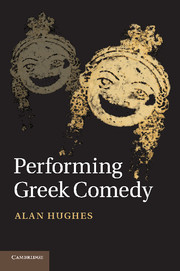Book contents
- Frontmatter
- Contents
- Illustrations
- Preface
- Chapter 1 Comedy in art, Athens and abroad
- Chapter 2 Poets of Old and Middle Comedy
- Chapter 3 Theatres
- Chapter 4 The comic chorus
- Chapter 5 Music in comedy
- Chapter 6 Acting, from lyric to dual consciousness
- Chapter 7 Technique and style of acting comedy
- Chapter 8 The masks of comedy
- Chapter 9 Costumes of Old and Middle Comedy
- Chapter 10 Comedy and women
- Chapter 11 New Comedy
- Catalogue of objects discussed
- Notes
- Glossary
- Bibliography
- Index
Chapter 4 - The comic chorus
Published online by Cambridge University Press: 05 February 2012
- Frontmatter
- Contents
- Illustrations
- Preface
- Chapter 1 Comedy in art, Athens and abroad
- Chapter 2 Poets of Old and Middle Comedy
- Chapter 3 Theatres
- Chapter 4 The comic chorus
- Chapter 5 Music in comedy
- Chapter 6 Acting, from lyric to dual consciousness
- Chapter 7 Technique and style of acting comedy
- Chapter 8 The masks of comedy
- Chapter 9 Costumes of Old and Middle Comedy
- Chapter 10 Comedy and women
- Chapter 11 New Comedy
- Catalogue of objects discussed
- Notes
- Glossary
- Bibliography
- Index
Summary
At the onset of one of those outbreaks of antiquarian enthusiasm with which western culture is periodically stricken, a friend confided to Thomas Gray his ambition to write a tragedy with a chorus. The poet's response was not encouraging:
A greater liberty in the choice of the fable, and the conduct of it, was the necessary consequence of retrenching the Chorus…The soft effusions of the soul, Mr. Mason, will not bear the presence of a gaping, singing, dancing, moralizing, uninteresting crowd. And not love alone, but every passion is checked and cooled by this fiddling crew…Could Hamlet have met the Ghost, or taken his mother to task in their company? If Othello had said a harsh word to his wife before them, would they not have danced to the window and called the watch?
Gray objected to the chorus because he found it unbelievable and, hence, preposterous. Ironically, realism is a significant legacy of Greek art. The development of sculpture from archaic kouroi to Praxitelean naturalism was a manifestation of the same aspiration to realism that led to the separation of the chorus from dramatic action in New Comedy. Western culture absorbed Greco-Roman realism with the Renaissance, applying it relentlessly to drama of all kinds, only countenancing a chorus within the surreal conventions of opera and ballet.
- Type
- Chapter
- Information
- Performing Greek Comedy , pp. 81 - 94Publisher: Cambridge University PressPrint publication year: 2011



